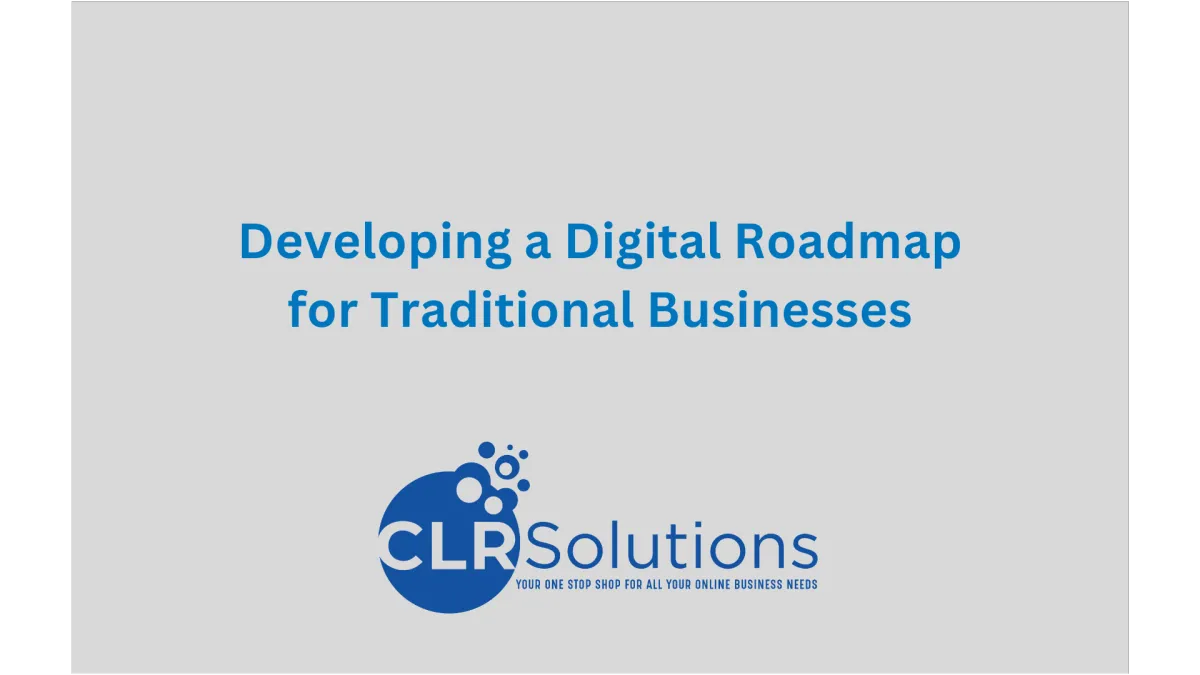Blogs
Blog

Developing a Digital Roadmap for Traditional Businesses: A Strategic Transformation Guide by CLR Solutions
The transition from traditional business models to digital-centric operations is essential in today’s technology-driven market. However, this shift can be daunting for businesses accustomed to conventional methods. CLR Solutions provides a comprehensive guide on developing a digital roadmap, helping traditional businesses navigate the digital landscape, embrace new technologies, and remain competitive in the evolving marketplace.
Understanding the Need for Digital Transformation
Highlighting the importance of digital adoption for traditional businesses:
Market Evolution: Recognizing how digital advancements have changed consumer behavior and market dynamics.
Competitive Advantage: The need to embrace digital tools to stay relevant and competitive.
Assessing Current Digital Capabilities
Evaluating the starting point for digital transformation:
Digital Maturity Assessment: Conducting an audit of existing digital assets and capabilities.
Identifying Gaps and Opportunities: Pinpointing areas needing enhancement or complete digital adoption.
Setting Clear Digital Objectives
Defining goals for the digital transformation journey:
Short-Term and Long-Term Goals: Establishing clear, achievable objectives for both immediate and future digital initiatives.
Alignment with Business Goals: Ensuring digital objectives align with the overall business strategy.
Developing a Comprehensive Digital Roadmap
Creating a step-by-step plan for digital adoption:
Phased Approach: Outlining a phased strategy for implementing digital changes.
Timeline and Milestones: Setting a realistic timeline with specific milestones for digital initiatives.
Building a Strong Online Presence
The first step in digital transformation:
Website Development: Creating a professional, user-friendly website.
SEO and Content Strategy: Developing an SEO strategy and compelling content to attract and engage online audiences.
Embracing E-commerce and Online Sales Channels
Expanding into online sales:
E-commerce Platform Selection: Choosing the right platform for online sales.
Digital Customer Experience: Designing an intuitive and seamless online shopping experience.
Leveraging Digital Marketing Tactics
Using digital channels to market products or services:
Social Media Marketing: Developing a strong presence on relevant social media platforms.
Email Marketing: Implementing targeted email campaigns for customer engagement and retention.
Integrating Technology into Business Operations
Adopting technology for improved efficiency:
Cloud Computing: Utilizing cloud services for data storage and accessibility.
CRM and Data Analytics: Implementing CRM software and utilizing data analytics for informed decision-making.
Focusing on Mobile Optimization
Ensuring mobile compatibility:
Responsive Design: Optimizing websites and digital content for mobile devices.
Mobile-First Approach: Prioritizing mobile user experiences in digital strategies.
Training and Supporting Staff in Digital Adoption
Equipping employees with digital skills:
Employee Training Programs: Offering training to develop digital competencies among staff.
Change Management: Supporting staff through the transition and encouraging a digital-first mindset.
Prioritizing Cybersecurity in Digital Transition
Securing digital assets:
Cybersecurity Measures: Implementing robust security protocols to protect digital data.
Regular Security Audits: Conducting frequent audits to identify and mitigate potential security risks.
Developing a digital roadmap is a vital step for traditional businesses looking to thrive in the digital age. It involves assessing current capabilities, setting clear objectives, building an online presence, embracing e-commerce, leveraging digital marketing, integrating technology, focusing on mobile optimization, training staff, and prioritizing cybersecurity. By following this structured approach, traditional businesses can effectively navigate their digital transformation journey, unlocking new opportunities for growth and success. CLR Solutions is committed to guiding businesses through this transformative process, ensuring a smooth and effective transition into the digital realm.

Whether you’re looking to increase visibility on search engines, build a stronger brand or increase traffic to your website, you need a Digital Marketing Company that can deliver the desired results.
Copyright © 2024 CLR Solutions. All Rights Reserved. Powered by CLR Solutions

Explore a better way to grow

Whether you’re looking to increase visibility on search engines, build a stronger brand or increase traffic to your website, you need a Digital Marketing Company that can deliver the desired results.




